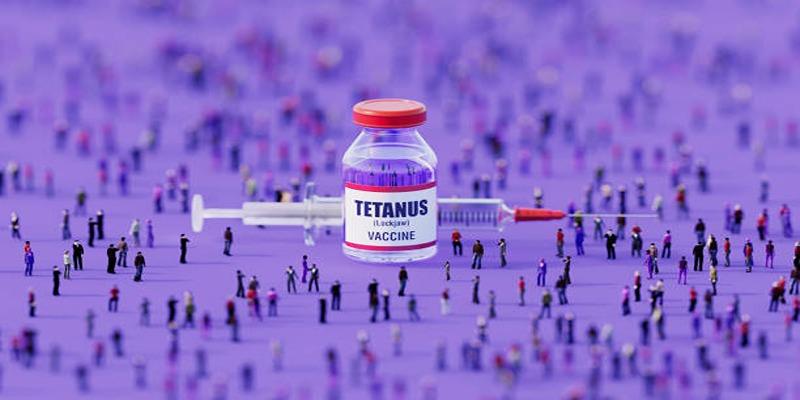The Importance of Tetanus Boosters for Adults
Advertisement
Tetanus is a severe bacterial disease that can result in muscle cramps and may even be life-threatening. Most adults tend to ignore the significance of keeping themselves immune through repeated tetanus injections. In this guide, we will discuss the reasons why one needs tetanus boosters, how frequently, and measures to remain protected.
What is Tetanus?

Tetanus, commonly known as "lockjaw," is caused by a toxin produced by the bacterium Clostridium tetani. This bacterium is typically found in soil, dust, and animal feces, and it can enter the body through wounds, cuts, or punctures. Once inside, the toxin spreads throughout the nervous system, leading to painful muscle stiffness and spasms, particularly in the jaw and neck. Without proper treatment, tetanus can cause complications such as difficulty breathing, seizures, or even death. The disease is not contagious but remains a significant health concern due to its severity and potential outcomes. Fortunately, tetanus is preventable through vaccination and timely booster shots.
How Tetanus Infects the Body
The bacterium enters the body through cuts, puncture wounds, or other breaks in the skin. Once inside, it produces a potent toxin called tetanospasmin. This toxin interferes with the nervous system by blocking signals that regulate muscle contractions, leading to severe spasms. Deep or contaminated wounds significantly increase the risk of infection.
High-Risk Situations
Individuals with puncture injuries, burns, or wounds contaminated by soil or feces face a higher risk of tetanus infection. Additionally, those who do not maintain their vaccination or booster shots are considered vulnerable. Living in environments with limited medical care and exposure to unsanitary conditions further heightens the likelihood of contracting the disease, underscoring the importance of both personal precautions and public health measures.
How Tetanus Vaccines Work?
The tetanus vaccine works by introducing an inactivated form of the tetanus toxin, known as a toxoid, into the body. This toxoid does not cause the disease but triggers the immune system to produce antibodies. These antibodies are then able to recognize and neutralize the toxin if the individual is exposed to it in the future.
By priming the immune system in this way, the vaccine provides long-lasting protection against tetanus. However, booster shots are required every 10 years to maintain immunity, as antibody levels can wane over time.
- Tdap (Tetanus, Diphtheria, Pertussis): Recommended for adolescents and adults; includes protection against pertussis (whooping cough).
- Td (Tetanus, Diphtheria): Used as a booster shot every 10 years for adults to sustain immunity.
- DT (Diphtheria, Tetanus): Administered to children under 7 who cannot receive vaccines with pertussis.
- DTP/DTaP (Diphtheria, Tetanus, Pertussis): Given to young children for initial immunization.
Importance of Tetanus Boosters for Adults:
Over time, the immunity provided by the tetanus vaccine gradually wanes, which is why booster shots are essential for maintaining protection. Without regular boosters, adults may become susceptible to tetanus, a potentially life-threatening condition caused by bacterial toxins.
Staying up-to-date with tetanus boosters not only helps prevent infection but also protects against serious complications such as muscle stiffness, lockjaw, and difficulties with breathing. Ensuring immunity is particularly critical after injuries involving cuts or puncture wounds, as these create an ideal environment for the bacteria to thrive.
Recommended Vaccination Schedule:
Tetanus booster shots are typically recommended every 10 years to ensure sustained immunity against the bacteria. Adults who cannot recall their last tetanus shot or have never been vaccinated should receive a dose as soon as possible, followed by subsequent boosters according to the standard schedule. Keeping a record of vaccination dates can help individuals stay on track and avoid lapses in protection.
Exceptions and Special Cases
Certain situations may require booster shots sooner than the standard 10-year interval. For instance, individuals who experience deep or contaminated wounds should consult a healthcare provider to determine if an immediate booster is necessary, especially if more than 5 years have passed since the last dose.
Additionally, people with compromised immune systems or those traveling to regions with higher tetanus risks may need personalized vaccination plans.
Consequences of Missing Boosters:
Failing to receive timely tetanus boosters can have significant health implications. Below, we outline key concerns related to missing vaccinations.
Risk of Tetanus Infection
Without regular boosters, the body's immunity against tetanus diminishes over time. This increases the risk of contracting tetanus, a serious bacterial infection that can lead to muscle stiffness, painful spasms, and even life-threatening complications such as respiratory failure. Tetanus bacteria are often found in soil, dust, and manure, making accidental exposure more common than many realize. Staying up to date on boosters ensures long-term protection against this preventable, yet potentially deadly, disease.
Complications from Travel
For those who travel frequently, missing tetanus boosters can pose additional risks. Travelers venturing into areas with limited access to medical care or regions where tetanus occurrences are higher may face delayed treatment if they sustain injuries.
Unvaccinated travelers could also jeopardize their immune defenses in areas with poor sanitation. Receiving the booster before traveling ensures protection against unforeseen injuries and minimizes the risk of contracting tetanus during international or remote adventures.
Public Health Impact
Missing booster doses not only affects individual health but also public health systems. While tetanus is not contagious, other vaccine-preventable diseases like diphtheria and pertussis, included in the Tdap vaccine, can spread within communities.
Outdated vaccinations compromise herd immunity, which protects vulnerable groups such as infants, elderly individuals, and immunocompromised people. Therefore, keeping vaccinations up to date contributes to overall community health and helps reduce the burden on healthcare services dealing with outbreaks.
Challenges in Emergency Situations
Emergencies like injuries or accidents requiring medical attention are more complex for individuals behind on boosters. Medical professionals might need to administer immediate immunizations or other treatments, causing delays and increasing the risk of infection.
Having an up-to-date vaccination record streamlines emergency medical care, enabling faster and more efficient management. Staying current with boosters eliminates unnecessary risks, ensuring timely and effective treatment when emergencies arise.

Conclusion:
Maintaining up-to-date vaccinations is crucial for personal health, community safety, and streamlined medical care in emergencies. Vaccines are powerful tools in preventing infectious diseases and reducing healthcare burdens through herd immunity. Neglecting boosters not only places individuals at risk but also compromises the safety of vulnerable groups. Furthermore, staying current ensures efficient emergency care without unnecessary delays or complications.
On this page
What is Tetanus? How Tetanus Infects the Body High-Risk Situations How Tetanus Vaccines Work? Importance of Tetanus Boosters for Adults: Recommended Vaccination Schedule: Exceptions and Special Cases Consequences of Missing Boosters: Risk of Tetanus Infection Complications from Travel Public Health Impact Challenges in Emergency Situations Conclusion:Advertisement












